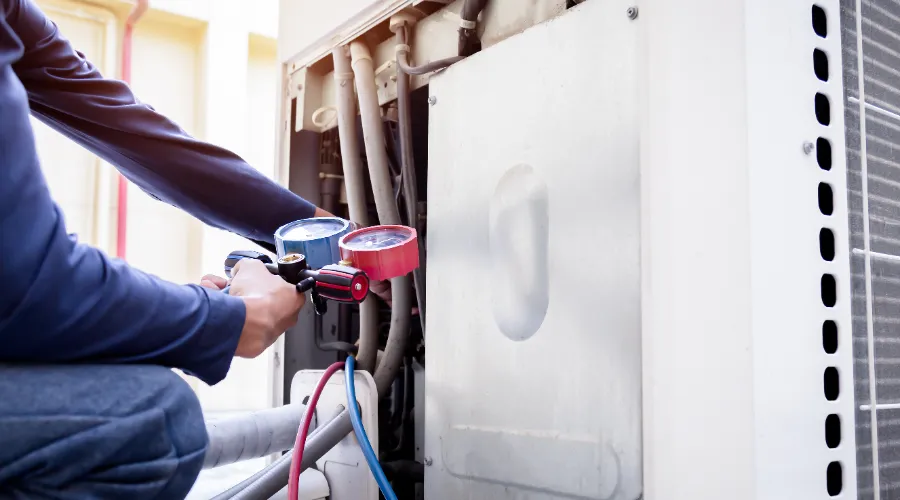The Best Choice: DMAK's HVAC Edwardsville IL Experts for Indoor Air Quality
The Best Choice: DMAK's HVAC Edwardsville IL Experts for Indoor Air Quality
Blog Article
How to Pick the Right Cooling And Heating System for Your Home or Workplace Needs
Selecting the ideal HVAC system for an office or home is no small task. It's a procedure that needs cautious assessment of individual heating, air conditioning, and ventilation demands, consideration of different system kinds, and assessment of energy efficiency. With the equilibrium of preliminary costs and long-lasting cost savings in mind, this complex choice needs complete research and specialist guidance. A wrong choice can result in pain, high power bills, and frequent upkeep problems. As a result, understanding the basics is essential.
Comprehending the Basics of A/c Equipments
An A/c system, an acronym for Home heating, Air Flow, and Air Conditioning, is an important component in keeping a healthy and balanced and comfortable indoor atmosphere. The intricacy of an A/c system can differ, varying from easy single-room systems to detailed systems that offer big commercial buildings. Understanding these essentials is the very first step in choosing the ideal Cooling and heating system.
Assessing Your Indoor Environment Requirements
Relocating from a basic understanding of Heating and cooling systems, the next step entails a mindful examination of your certain interior climate requirements. A larger space might require an extra durable system, while a smaller sized location might not require as much power. Regions with severe temperatures may need systems with higher efficiency.
Discovering Various Kinds Of HVAC Systems
Browsing with the complexities of HVAC systems can be difficult. It is essential to recognize the variety of a/c ranges readily available, and to make an enlightened choice based on cost and performance contrasts. This expedition will certainly offer a more clear viewpoint on what each kind of cooling and heating system uses.
Comprehending HVAC Ranges
Ever questioned about the multitude of alternatives when it involves cooling and heating systems? There are essentially four main types to take into consideration. Central cooling and heating systems, one of the most usual, make use of ductwork to disperse warm or awesome air throughout your house. Ductless, mini-split systems, on the other hand, provide temperature level control for specific rooms, perfect for homes with 'locations'. Heat pumps make use of electricity to move warm from a cool area to a cozy space, making the great area cooler and the warm space warmer. Finally, packaged heating and air conditioning systems include the blower, home heating, and cooling parts done in one system. Each type has its unique advantages, and understanding these can aid one make a notified decision.

Cost and Efficiency Comparison
When exploring the large array of Cooling and heating systems, it is important to consider both expense and effectiveness. On the contrary, a lot more pricey systems often tend to be a lot more energy-efficient, conserving money in the lengthy run.
For example, central air conditioning systems, though expensive, are usually a lot more effective than window systems. Similarly, heatpump are expensive however offer heating and cooling capacities, making them a cost-effective, year-round remedy.
Furthermore, it is essential to check out the system's Seasonal Power Effectiveness Ratio (SEER) A greater SEER ranking indicates much better energy efficiency, which equates to reduced operating prices (DMAK's HVAC Edwardsville IL Experts). For this reason, investing intelligently in a well-chosen cooling and heating system corresponds to long-term financial savings.
Energy-Efficiency and Your Cooling And Heating System
The value of energy-efficiency in HVAC systems can not be overstated. The first click to read more action towards an energy-efficient a/c system is recognizing the scores and selecting the ideal models. This will certainly not only benefit the setting however also cause significant expense savings.
Comprehending Energy-Efficiency Scores
Why is energy-efficiency important in your HVAC system? Energy-efficiency rankings offer as an important guide to identify the prospective energy intake and savings of a Cooling and heating system. This rating, generally revealed in SEER (Seasonal Energy Performance Ratio) for air conditioners or AFUE (Annual Gas Use Effectiveness) for heating systems, supplies a clear indication of the system's energy efficiency.
Picking Energy-Efficient Versions
How does one go concerning choosing energy-efficient cooling and heating designs? Firstly, understanding energy scores such as SEER, EER, and HSPF is crucial. These scores suggest the effectiveness of the system, with greater worths representing greater effectiveness. It's likewise important to take into consideration the dimension of the a/c system, as bigger devices often tend to be a lot more energy-efficient. The system dimension ought to be suitable for the room to avoid energy waste. An additional factor to consider is the type of a/c system. Warmth pumps are commonly extra energy-efficient than standard systems. Look for designs that have energy-saving features, such as variable rate motors or programmable find out here now thermostats. Making an energy-efficient choice can significantly lower power intake and ecological effect.
Cost Advantages Evaluation

After taking right into account the various aspects that influence the power performance read the full info here of A/c systems, it is useful to analyze the expense benefits that come with these selections. In the long run, a high-efficiency A/c system can pay for itself through power cost savings, while also raising the home's value. When selecting a HVAC system, the cost benefits of power efficiency ought to be an essential consideration.
When Picking a Heating And Cooling System, price Considerations.

Installation and Upkeep Aspects of Cooling And Heating Solutions
Navigating the installation and upkeep of heating and cooling systems can be a complicated task. The process normally requires a specific understanding of the system's requirements, which may consist of ductwork installation, electric wiring, and appropriate placing. Specialists in the area are commonly employed to handle this due to the technical abilities needed.
Post-installation, the upkeep of these systems is essential to ensure their longevity and performance. Normal servicing, including filter modifications and system checks, is usually suggested. This procedure involves examination of all components, cleansing, and adjusting to guarantee the system functions efficiently. Ignoring upkeep can lead to compromised performance, higher power usage, and ultimately, system failing. Consequently, comprehending the nuances of installment and precautionary upkeep is vital when selecting a cooling and heating system.
Conclusion
In conclusion, choosing the appropriate HVAC system calls for a thorough understanding of the essentials, assessment of indoor climate demands, exploration of different system kinds, and consideration of power efficiency and expense. It's vital to think about both setup and upkeep elements. By thoroughly assessing these variables, one can effectively choose the heating and cooling system that supplies optimum convenience and effectiveness in both household and commercial settings.
The intricacy of a Cooling and heating system can differ, varying from straightforward single-room units to detailed systems that offer large commercial structures. DMAK's HVAC Edwardsville IL Experts. Energy-efficiency rankings serve as a vital guide to determine the prospective energy intake and financial savings of a HVAC system.After taking into account the different aspects that impact the energy efficiency of Cooling and heating systems, it is beneficial to examine the price advantages that come with these selections. When choosing a Cooling and heating system, the expense benefits of power effectiveness ought to be a key factor to consider
In final thought, selecting the right Cooling and heating system calls for a complete understanding of the essentials, assessment of indoor climate demands, exploration of various system types, and consideration of energy performance and expense.
Report this page